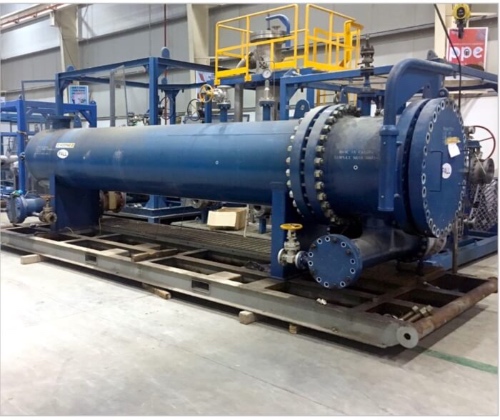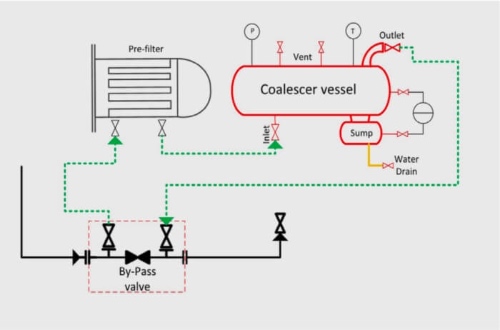Petróleo e gás: foco da aplicação
O skid móvel de filtração é equipado com cartuchos filtrantes de alto fluxo e classificação Absoluta. É uma solução confiável e econômica para ajudar a manter fornecimento contínuo de combustíveis limpos aos usuários finais, independente dos níveis de contaminação acumulados do transporte nas tubulações ou qualquer outra fonte de contaminação.
Uma empresa de Petróleo e Gás do Oriente Médio opera um parque de tanques que fornece combustível de jato para um dos mais importantes aeroportos internacionais no país.
Um dos dois skids para partículas sólidas de alto fluxo Ultipleat da Pall.
Desafio - Combustível de jato contaminado
Ao longo de vários anos, o parque de tanques recebeu combustível de jato contaminado (contendo sólidos e água livre) e, portanto, o combustível exigia um longo período de assentamento (entre 2 dias a 1 semana) e uma filtração adicional antes de poder ser entregue ao usuário final. Isso criou um desafio quando a demanda por suprimento era alta e incorria em custos adicionais envolvendo transporte externo para processamento, visando atender às especificações de limpeza do combustível exigidas.
Solução da Pall - Skids móveis de filtração de particulados e coalescedor
Após uma análise inicial da contaminação do combustível de jato, a Pall propôs que dois skids móveis de filtração de partículas e dois skids móveis de coalescedor fossem instalados para alcançar o nível exigido de remoção de sólidos e água na linha principal a montante dos tanques de assentamento, para despoluir o combustível de jato recebido nos tanques.
O objetivo era reduzir o nível de contaminação por sólidos (conteúdo Total de sólidos em suspensão ou TSS) para abaixo de 1 mg/l e remover todo o conteúdo de água livre em uma única passada por estágio único de filtração dentro de uma área compacta, adequada para o espaço limitado disponível no local.
Os skids de filtração equipados com filtros cartuchos high flow Ultipleat® com classificação "absolute" de 2 micron da Pall (o desempenho deles é validado e reproduzível) foram entregues, instalados e implementados de forma rápida e diretamente da extensa frota da Pall para locação na região.
Feedback operacional
A despoluição do combustível de jato foi alcançada com sucesso em uma única passada dos filtros para partículas de 2 microns com classificação “absoluta” e filtros coalescentes líquido/líquido Aquasep® XS. Ao contrário dos elementos de filtro coalescedente de fibra de vidro convencionais, o material filtrante polimérico utilizado nos coalescedores Aquasep XS da Pall evita de modo eficiente o desarme (isto é, a incapacidade de coalescer e separar água), garantindo vida útil longa e fornecendo combustível de jato “limpo e brilhante” de modo consistente a jusante.
Os resultados da análise subsequente confirmaram que os níveis de contaminação por sólidos a jusante estavam significativamente abaixo dos limites máximos permitidos (Total de sólidos em suspensão em média a montante: 6 mg/L, a jusante TSS <1 ) e que o combustível não continha água, significando que estava pronto para ser despachado para o usuário final, sem assentamento ou processamento externo.
Com base nos resultados, a planta ficou feliz com a solução de despoluição da Pall e reteve o skid móvel de filtração para aluguel em operação até que um sistema de filtração absoluta permanente fosse adquirido e instalado.
Conclusão
O skid móvel de filtração da Pall equipado com cartuchos filtrantes de fluxo alto e classificação absoluta é uma solução confiável e econômica para ajudar a manter fornecimento contínuo de combustíveis limpos aos usuários finais, independente dos níveis de contaminação acumulados do transporte nas tubulações ou qualquer outra fonte de contaminação.

